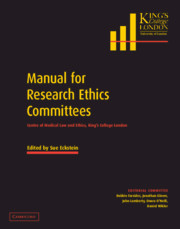Book contents
- Frontmatter
- Contents
- Editorial board
- Acknowledgements
- List of contributors
- Introduction
- Part I
- 1 The ethics of clinical research
- 2 Research ethics committees and the law
- 3 The regulation of medical research: a historical overview
- 4 The regulation of medical research in the UK
- 5 Observational and epidemiological research
- 6 Social survey research
- 7 Approaching qualitative research
- 8 Complementary and alternative medicine: challenges for research ethics committees
- 9 The ethical review of student research in the context of the governance arrangements for research ethics committees
- 10 The ethics of genetic research
- 11 Research or audit?
- 12 Randomised controlled trials
- 13 Determining the study size
- 14 Risk assessment for research participants
- 15 Absorbed radiation in patient and volunteer studies submitted to the ethical committee: a memorandum
- 16 A guide to the use of radioactive materials and radiological procedures for research purposes
- 17 Indemnity in medical research
- 18 The prevention and management of fraud and misconduct: the role of the LREC
- 19 Understanding clinical trials: a model for providing information to potential participants
- 20 The law relating to consent
- 21 Writing information for potential research participants
- 22 The law relating to confidentiality
- 23 Research involving vulnerable participants: some ethical issues
- 24 The ethics of research related to healthcare in developing countries
- Part II
- Index
19 - Understanding clinical trials: a model for providing information to potential participants
Published online by Cambridge University Press: 08 January 2010
- Frontmatter
- Contents
- Editorial board
- Acknowledgements
- List of contributors
- Introduction
- Part I
- 1 The ethics of clinical research
- 2 Research ethics committees and the law
- 3 The regulation of medical research: a historical overview
- 4 The regulation of medical research in the UK
- 5 Observational and epidemiological research
- 6 Social survey research
- 7 Approaching qualitative research
- 8 Complementary and alternative medicine: challenges for research ethics committees
- 9 The ethical review of student research in the context of the governance arrangements for research ethics committees
- 10 The ethics of genetic research
- 11 Research or audit?
- 12 Randomised controlled trials
- 13 Determining the study size
- 14 Risk assessment for research participants
- 15 Absorbed radiation in patient and volunteer studies submitted to the ethical committee: a memorandum
- 16 A guide to the use of radioactive materials and radiological procedures for research purposes
- 17 Indemnity in medical research
- 18 The prevention and management of fraud and misconduct: the role of the LREC
- 19 Understanding clinical trials: a model for providing information to potential participants
- 20 The law relating to consent
- 21 Writing information for potential research participants
- 22 The law relating to confidentiality
- 23 Research involving vulnerable participants: some ethical issues
- 24 The ethics of research related to healthcare in developing countries
- Part II
- Index
Summary
How to use this booklet
For many people the idea of being involved in research raises fears of ‘experimentation’ or of being a ‘guinea-pig’. Understanding what is involved in taking part in a research study can ease many of these anxieties. This booklet answers the questions patients ask most often about clinical trials, and can help you decide about taking part in a trial. It is meant to add to the information your doctor has already given you.
The ‘Glossary’ defines some of the common technical words used in clinical trials.
What is a clinical trial?
Almost every week we hear of a new drug for the treatment of a disease, or of a new diagnostic test or surgical procedure. These new treatments, tests and procedures must be shown to be effective and safe before they can be marketed or used more widely. A clinical trial is a research study in patients to test the usefulness and safety of a promising new treatment or procedure.
Clinical trials are used to study new ways to prevent, diagnose or treat diseases. Most trials evaluate new drugs or drug combinations, for example, antibiotic treatments for an infectious disease, or chemotherapy for a specific cancer. Other trials might test new radiation treatments or surgical procedures, such as a comparison of radical mastectomy vs. lumpectomy for the treatment of breast cancer. The example of a drug trial will be used throughout the rest of the booklet.
Clinical trials begin only after preliminary studies in the laboratory and with animals have shown promising results.
- Type
- Chapter
- Information
- Manual for Research Ethics CommitteesCentre of Medical Law and Ethics, King's College London, pp. 83 - 88Publisher: Cambridge University PressPrint publication year: 2003

